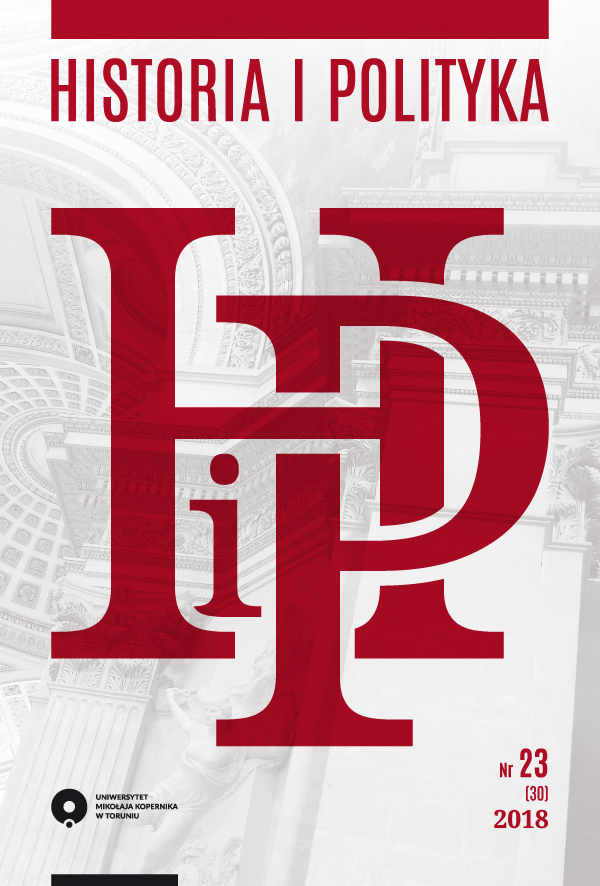Hybrydyzacja obszarów badawczych środowiska (nie)bezpieczeństwa nie tylko w dyscyplinie socjologii
DOI:
https://doi.org/10.12775/HiP.2018.006Keywords
socjologia, bezpieczeństwo, środowisko (nie)bezpieczeństwa, hybrydyzacja, hybrydalnośćAbstract
Sociological exploration of topics related to broadly understood security is carried out using the following approaches or theoretical concepts: sociology of security, sociology of dispositional groups, sociology of risk and uncertainty or sociology of disasters and crisis management. The multiplicity of these areas of research of the (in)security landscape in the discipline of sociology is due to the adoption of different perspectives for the view of interesting investigators. However, each of them contributes to building a range of knowledge that strengthens the sensitivity of the social fabric to all kinds of threats. Ensuring security should be understood here as a conscious effort, supported by rationality, creating conditions for social development. The paper proposes the possibility of using supra-disciplinary logic to view issues related to security based on assumptions of hybridization. We would like to prove that the following thesis is justified from the point of view of contemporary challenges: The hybrid concept remains the most adequate analytical construction for issues related to ensuring security. Considerations on the hybridization of environmental (in) security research areas becomes an extremely interesting concept, filling in the “structural gaps” existing in the classical approaches of individual disciplines.
References
Acheraïou, A. (2011). Questioning Hybridity, Postcolonialism and Globalization. London: Palgrave Macmillan.
Alderson, P. (2017). Book review: Reconstructing Sociology: The Critical Realist Approach. The Sociological Review, Volume 65/3.
Bajc, V. (2013). Sociological Reflections on Security Through Surveillance. Sociological Forum, Volume 28, Issue 3.
Bhabha, H.K. (1994). The location of culture. London and New York: Routledge.
Erasga, D.S. (2012). Biopolitics: Biodiversity as Discourse of Claims. W: D. Erasga (red.), Sociological Landscape – Theories, Realities and Trends. Croatia: InTech.
Hazan, H. (2015). Against Hybridity Social Impasses in a Globalizing World. Cambridge: Polity.
Iyall Smith, K.E., Leavy P. (eds.). (2008). Hybrid Identities: Theoretical and Empirical Examinations. Leiden& Boston: Brill.
Jabłoński, A. (2015). Spójność hybrydy strategicznej w środowisku sieciowym. Warszawa: Difin.
Jensen, T.E. (2011). Bruno Latour: Hybrid Thoughts in a Hybrid World. London: Routledge.
Kalra, V., Kaur, R., Hutnyk, J. (2005). Diaspora and Hybridity. London, California and New Delhi: SAGE Publications Ltd. (Published in association with Theory, Culture & Society).
Kamieński, Ł. (2014). Nowy wspaniały żołnierz. Rewolucja biotechnologiczna i wojna w XXI wieku. Kraków: Uniwersytet Jagielloński.
Kendall, G. (2013). Bruno Latour: Hybrid Thoughts in a Hybrid World. Contemporary Sociology: A Journal of Reviews, No 42.
Maciejewski, J. (2014). Grupy dyspozycyjne. Analiza socjologiczna. Wydanie drugie rozszerzone. Wrocław: Uniwersytet Wrocławski.
Manterys, A. (1997). Wielość rzeczywistości w teoriach społecznych. Warszawa: PWN.
McSweeney, B. (2004). Security, Identity and Interests: A Sociology of International Relations (Cambridge Studies in International Relations 69). Cambridge: Cambridge University Press.
Murray, W., Mansoor, P.R. (2012). Hybrid Warfare: Fighting Complex Opponents from the Ancient World to the Present. Cambridge: Cambridge University Press.
Nederveen Pieterse, J. (2009). Globalization and Culture: Global Mélange, Second Edition. United Kingdom: Rowman & Littlefield Publishers, Inc.
Papastergiadis, N. (2000). The Turbulence of Migration: Globalization, Deterritorialization and Hybridity. Cambridge: Blackwell Publishers Ltd.
Paris, R. (2001). Human Security: Paradigm Shift or Hot Air? International Security, Volume 26, Issue 2.
Rowe, W., Schelling, V. (1991). Memory and Modernity: Popular Culture in Latin America. London: Verso.
Sáenz, R. (2013). Reflections on the Sociology of Security and Surveillance in the Study of Immigration. Sociological Forum, Volume 28, Issue 3.
Side, E.W. (2009). Kultura i imperializm. Kraków: Uniwersytet Jagielloński.
Skelcher, Ch., Sullivan, H., Jeffares, S. (2013). Hybrid Governance in European Cities: Neighbourhood, Migration and Democracy. New York: Palgrave Macmillan.
Soja, E.W. (1996). Third space: Journeys to Los Angeles and Other Real-and-Imagined Places. Malden–Oxford: Blackwell Publishers.
Stampnitzky, L. (2013). Toward a Sociology of “Security”. Sociological Forum, Volume 28(3).
Stochmal, M. (2015). Państwowa Straż Pożarna w systemie bezpieczeństwa państwa. Studium socjologiczne. Wrocław: Uniwersytet Wrocławski.
Thomas, W.I. (1923). The Unadjusted Girl. Whit Cases and Standpoint for Behavior Analysis. Criminal Science Monograph 4. Boston: The American Institute of Criminal Law and Criminology.
Zagórski, Z. (1999). Socjologia bezpieczeństwa. O potrzebie nowej subdyscypliny? W: T. Leszczykiewicz, Z. Zagórski (red.), Socjologiczne aspekty bezpieczeństwa Narodowego. Wrocław: Wyd. WSO im. T. Kościuszki.
Zedner, L. (2003). Too much security?. International Journal of the Sociology of Law, Volume 31, Issue 3.
Zedner, L. (2009). Security. Key Ideas in Criminology. New York: Routledge.
Znaniecki, F. (1990). Studium nad antagonizmem do obcych. W: Z. Dulczewski (tłum.), Współczesne narody. Socjologiczne studium ewolucji narodów. Warszawa: Wyd. PWN.
Downloads
Published
How to Cite
Issue
Section
License
Copyright (c) 2018 Historia i Polityka

This work is licensed under a Creative Commons Attribution-NoDerivatives 4.0 International License.
Nicolaus Copernicus University fully respects the right to privacy and protection of personal data of all authors. The authors’ personal data is not used for commercial and/or marketing purposes.Stats
Number of views and downloads: 640
Number of citations: 0



